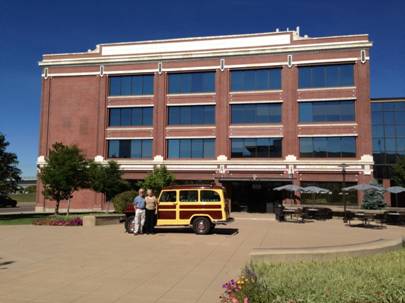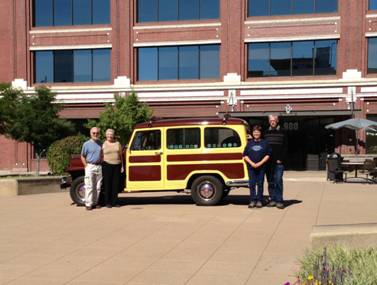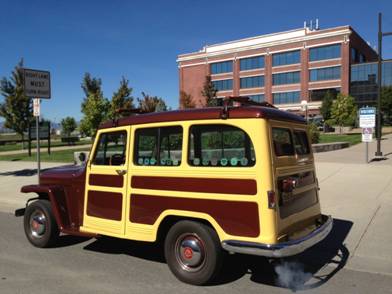Sunday, October 6, 2013 was a big day. We were back in Denver, the city where we, as well as the 1920 Park-to-Park Tour group, had begun and completed our respective National Park tours. We felt that it would be appropriate for us to finalize the tour by traveling to the very spot where the original 1920 tour group completed their tour.
Jane and Lee Whiteley, the authors of the book The Playground Trail that inspired Jean and me to make our Trek, graciously offered to guide us to the termination site of the tour; the location of the former Gates Rubber and Ford Motor Company buildings on the 900 block of South Broadway Street in Denver. After a scrumptious brunch at the same location where we met the Whiteleys prior to the start of our tour, Jane and Lee escorted Jean and me with our Jeep to the very spot where good roads boosters greeted the Tour party at completion of the 1920 Park-to-Park Tour.
In 1920, this portion of Broadway had been cordoned off for the festivities. We, of course, commanded no such recognition and were resolved to taking photographs of our finale from a less trafficked side street. Fortunately, through a fortuitous twist of happenstance we were able to pose the Jeep directly in front of what was in 1920, a Ford Motor Company assembly building.

Jeep in front of the former Ford Motor Company assembly building on South Broadway Street, Denver, CO, on the route of the 1920 Park-to-Park Tour finale.

Dan & Jean with Jane & Lee Whiteley in front of the former Ford Motor Company assembly building on South Broadway Street in Denver, Colorado
Note: It is my understanding that the former Ford Motor Company assembly building is now owned by an independent management company. The Gates Rubber Company building that stood across Broadway from it has been razed and the balance of the huge Gates manufacturing complex mothballed.
As with many anticipated achievements in life, the total Trek including this culminating act of actually driving our vehicle down the street where to 1920 Park-to-Park Tour group completed their tour, will take some time to sink in. Certainly, we did not, for a number of reasons, follow the exact route taken by the 1920 tour group; nor did we follow the exact route mapped out by the original Park-to-Park Tour planners. However, we did visit all 12 of the National Parks designated in the original Park-to-Park plan and did, as well as possible, drive at a minimum, the routes within the National Parks traveled by the original Park-to-Park Tour group.
Unquestionably, the 1950 Jeep station wagon automobile, although spartan and primitive by today’s standards, was a far more luxurious and potentially more reliable than the 1920 vehicles on the original 1920 Park-to-Park Tour. That being said, we did experience a strong sense of adventure traversing long expanses of sparsely inhabited territory and negotiating difficult passages in our 63 year old vehicle, as well as resolving mechanical issues in unfamiliar surroundings. From that standpoint, we humbly profess that we can in some way relate to the experiences of the hearty folks that partook in the original tour; and in some small way, share in their sense of accomplishment.
What’s next: For Jean, me and Jenny the Jeep there was still one last leg of the journey, from Denver, Colorado to Cary, North Carolina to complete. The discovery of copious amounts of steam pouring from Jenny’s tailpipe just as we approached the site of the tour finale in Denver soon prove to add an additional challenge to the completion of our Trek.

Indication of a likely serious engine problem at the completion of the Park-to-Park tour loop in Denver, CO
10-6-13 Driving up Broadway, Denver, CO to the former Ford Motor building for the completion of our Park-to-Park tour